- Home
- Frank Delaney
Tipperary: A Novel of Ireland Page 8
Tipperary: A Novel of Ireland Read online
Page 8
Above all, if, during his first mile east or west of his home, he looked south, he saw through the trees the turrets and ramparts of the great mansion that would one day become one of his life's two great preoccupations.
Furthermore, he knew from his own locality that the Irish countryside abounds with history, a serious factor in his life. Barons and despots led armies across here. Wild men abducted beautiful women here. Poets wrote famous songs here. Conspirators plotted revolution here.
And in the ordinary commerce of the time, romantic yet practical figures crossed this stage—such as the wine salesman from Woodford Bourne, in Cork, who rode across this countryside to the well-to-do houses (such as the O'Briens'); or the undertaker's clerk, who rode down through the woods behind the house to measure old Mrs. O'Brien, Charles's grandmother, for her coffin. And the ghosts of two famous hunting hounds ran the crests of the hills in winter twilights.
Judging from his powers of observation, Charles O'Brien must have known all these haunting things, and his sense of story glowed brighter and brighter. Therefore, when the time came to choose a life for himself, he did not elect to stay in one place. He found a means of combining his three loves, of looking at the countryside, learning about his land and its people, and contributing to their lives—while observing them.
When I gained the age of twenty-one, Father deemed my four-handed education not merely complete but the equal of any university. Buckley, he knew, would have no ongoing part in my life; Mr. Halloran had shown, in his timid way, some impatience with my mathematical endeavors. Mrs. Curry's influence with Oxford, and Miss Taylor's with Trinity College, Dublin, took no root in my father, who said that too much further education might weaken me. He had expected that I must follow him into the management of the farm. If he felt disappointment that I did not do so, he concealed it from me; Father's good manners inspire all who know him.
At one time after this decision became plain, it had crossed the family table that I might try for being a doctor. Mother praised my humanity and Euclid thought that I should enjoy very much “meeting the people,” as he put it, “and cutting them open.” I believe that the idea of medicine had originated with my father—but then he changed his mind and said that being a doctor carried with it a difficult and, in his view, inessential burden of respectability, and a man should not think of such things until he had sown some wild oats.
“But if healing the sick seems like a necessary power to you,” he said, “you might think of belonging to an older tradition than doctoring. And it'll get you out and about.”
He sent me with a letter of introduction to a man some miles away, near Bansha, a man named Egan. I remembered this man well, and with good reason. At the age of six, I became covered in ringworm, an infection picked up from our cattle. Large circles of sore and itchy red scales covered my body from my ankles to my neck, and we saw doctors in Limerick, Cork, and Dublin, as well as our own beloved Dr. O'Malley. None of them, for all their goodwill and sympathy, could help me; their ointments and oils failed to make a cure.
Down in the kitchen, Cally, the housekeeper, and Mrs. Ryan's daughter, Biddy, who plucked our fowl for the table, directed us to Mr. Egan.
Biddy, from among the feathers: “He's a quack all right, ma'am, but he's kind of, like, a better class of a quack.”
Cally, hands a-floured with baking: “Isn't he back from Colorado, isn't he, working on the railways with them Red Indians and them sort of people?”
Biddy: “And he brought the snake-oil home with him, ma'am, and anybody'd tell you that snake-oil is the best thing of all. I heard the Pope uses it if he has anything at him, like, you know, boils and things.”
Oh, I wanted to see snake-oil. Did it have iridescent colors? Was it compounded from different venoms?
I remembered Mr. Egan as an exceptionally kind and warm-hearted little man, with a huge wife. (“He has a mountain to climb,” said my father on the way home. My mother laughed and laughed; I was only six.) My parents and I had been shown into a small bedroom at the rear of the cottage, where portraits of racing greyhounds had been pinned up around the walls. Mr. Egan looked at such ringworm on me as he could view without my undressing, and said to my parents, “We'll only try it out on what we can see.”
He produced the bottle, which, to my disappointment, contained a muddy green liquid streaked with yellow and orange until he shook it, when it became an opaque mud color; I had expected glittering scales and diamond patterns. When I took off my shoes and stockings and rolled up the legs of my knickerbockers, Mr. Egan, using a large goose feather, began to paint my sores. The liquid hurt like fury, stung me to tears.
My perturbed father asked, “What is that stuff? Is that—?”
“Snake-oil, sir.”
“And what kind of a snake?”
“They call it a king rattlesnake.”
“Ah, no wonder it stings,” said my father. To console me he said, “Now you'll never be killed by a king rattlesnake; you'll have the antidote already inside you.”
“That's so,” said Mr. Egan, and we all agreed afterward that he seemed an especially sound man. We agreed it doubly when, next morning, the ringworm began to disappear from my skin. The raw red badges seemed almost to fade even as we looked at them, and we were jubilant. Mother then painted the other affected parts of my body, and by the weekend each ringworm circle had receded to a mild glow; Father kept the rest of the bottle for the cattle.
“I'm going to put money on a horse for that man,” he said. He often did this—but he never told them beforehand; as he said, “I don't want them following the race and then being disappointed.”
Recently, I asked Mother, whose memory remains excellent, whether she had ever heard anyone thank Father for the winnings from such a gift. She looked at me, reflected for a moment, and then crumpled with laughter.
Given that little oasis of personal history with ringworm, I felt more than pleased when my father suggested that I learn healing from Mr. Egan—who, when I went to see him, remembered my parents and me, and therefore listened attentively to the notion of my becoming his apprentice. His wife, larger than ever, seemed especially interested in the venture. But it seemed to present a difficulty to them, and I understood the problem: the slow business of teaching someone else all that Mr. Egan knew; the presence of another person by his side all day, every day; the confidences that he must exercise, yet keep. And he put these points to me very clearly. However, I am pleased to say that my father had given me liberty to make an offer of payment for serving my time. I was proud to have overcome Mr. Egan's objections by increasing the amount a few times, whereupon the good healer caved in—and most graciously.
His first lesson drew on knowledge that I already possessed—recognition of wild plants. Mr. Egan sent me out to collect foxglove, Digitalis purpurea. I knew it well and I knew where to find it—in hedgerows facing southwest and sometimes a little overhung by the shrubs surrounding it. When I returned, Mr. Egan expressed his pleasure.
“And you didn't get it still green?” he said. “Well, very good.”
He then showed me his preparation, which he gave to people with weak hearts. I have undertaken to keep his secrets, and therefore I cannot pass on to the world his excellent remedy for all manner of heart ailment.
“When I started using this first,” he told me, “we had a little accident. Well, she was an old lady anyway, and there was a sense in which she had a blessed release. But it taught me never to mix too strong a mixture. And you know, don't you, that you should never eat the foxglove itself? Down you'll go like a stone if you do, straight down dead. Well, experience is the best teacher.”
Urtica provided my next quest—the common nettle; I never learned the other half of its botanical name. But through Mr. Egan I did learn of its efficacy in bringing about sleep if mixed in a soup; and of rubbing it on the skin to cure wasp and bee stings. Mr. Egan asked if I knew where to find nettles, and I said that they grow in many places. However, he di
rected me to the most abundant source of all.
“Outside any house,” he said, “find the plot of ground where people empty theirselves and that's where the nettle grows.” And, as I told him, I already knew how to pluck a nettle—reach straight for it, grasp the leaf directly, and it will not sting.
One day, we sat outside Mr. Egan's door in the sunshine, mixing his powders and allocating them into his little boxes. (“My boxes,” he would exclaim when we traveled, “did I forget my boxes again?”—but he never did.) At noon, a most exotic gentleman arrived. Mr. Egan jumped up to meet him and they had a vigorous and delighted exchange. The man wore a wide scarlet cloth bound tightly about his head, and his mustaches looped like the horns of a foreign ram.
Mr. Egan introduced me. “Mr. O'Brien, come here till you meet my friend and colleague Mr. Juniper Singh.”
The man smelt of coconut, and he had a delightful smile. I learned that he supplied Mr. Egan with powdered juniper, whose efficacy contributed much to Mr. Egan's repute; it often proved satisfactory in the release from “the stone.” Many Irish people build stones in their kidneys; Mr. Egan takes the opinion that it comes of drinking too much milk.
Juniper Singh agreed: “Yes, very definitely, very very definitely. Much too much milk. And we must not forget—much too much cream.”
I shall refer again and again to my seven years with Mr. Egan—they proved enchanting. At the end of it my father said, “Hippocrates is up against it now” and then added, “And so, by the way, is King Croesus.”
At which I smiled ruefully, and thanked him mightily, told him that I would prove a credit to him. He said that I already was, that he had been hearing details from all around the countryside as to what a kind healer I was turning out to be, and that several people believed that they owed to me some great improvements in their lives. It was true that I had visited many homes—always, of course, with Mr. Egan. We saw myriad patients with myriad illnesses; some we cured utterly and some less so.
Especially satisfying to me were those cures, as with my ringworm, where everything else had failed. A man in North Cork approached our booth at a cattle fair one day and asked whether we could help cure his throat ailment. He opened his mouth; Mr. Egan looked in, recoiled a little, and then said to me, “Mr. O'Brien, I'd much appreciate your opinion.”
I looked in too, and this poor fellow's throat was shining-red raw— how he spoke I do not know. Mr. Egan looked at me inquiringly, and we both pondered for a little time.
“Do you swallow much?” I asked the gentleman. “I mean—outside of when you are eating or drinking?”
Later, Mr. Egan confided that he thought me brilliant for thinking of such a question.
“I have a nervous disposition,” said the man. “I swallow a lot even when my mouth is dry, and it's a bit of a habit with me now.”
“You mean—when something threatens you or makes you feel uncertain, you swallow.”
“And swallow again,” said the man. “My wife is a bit on the harsh side.”
“Therefore,” I deduced, “if you have nothing to swallow, you merely rub the sides of your throat against each other.”
So I devised a small piece of iron for him, to keep in his cheek until he recovered from the habit. In other words, I replaced his fears with a greater fear—that of swallowing the iron, which, I told him, he should never be able to pass through his system, and that it would therefore live in him and rust in his body's waters and cause severe illness.
Then we gave him a sage-and-chamomile powder, told him to make it as if making tea, and to gargle with it. Mr. Egan lastly sold him a lavender-and-eucalyptus oil, which the sufferer must rub into the skin of the throat. He went on his way a pleased man and, as the word spread around the fair, we spent the rest of that day overwhelmed with people seeking our skills.
On the easy pathway to his “career” decision—love of the countryside, the wish to discover his nation, the desire to heal—Mr. O'Brien omitted one colorful detail. In his youth he would have seen interesting travelers arrive at his home. Nineteenth-century rural Ireland abounded with itinerants of all kinds. Every country fair, parish, town, and village had a traveling somebody-or-other—herbalist, singer, peddler, storyteller, troupe of actors. Many of these, such as Juniper Singh, had an exotic whiff.
Peddlers, often with their goods on a brightly colored tray or in a gaudy tin box, sold hairpins, bootlaces, cotton thread on reels, cards of elastic, needles, and pins, decks of playing cards. Juniper Singh (whom it has proven impossible to trace) was almost certainly an Indian peddler who got to Ireland via London and Liverpool, and whose exotic appearance formed part of his commercial style. Other itinerants, dressed like Gypsies, told fortunes. “Cross my palm with silver,” they said, and, naturally, the more silver coins, the rosier the future.
The healers sold magical oils—hair restorers, “vigor potions” for men, elixirs of love and life. More seriously, they brought cures, which would be discussed long after they had departed. Some claimed to specialize, such as in settling rheumatism or, in Mr. Egan's case, curing ringworm, which was widespread in the rural communities.
Renown went according to efficacy, and fame was available. Certainly the arrival of a healer with a reputation brought an audience. To this day, certain healers—admittedly of the more mystical kind—will pack the halls in some Irish counties. A seventh son of a seventh son is still thought to possess extraordinary powers.
Charles O'Brien made no such quasi-divine claims. He served his time to a man who at least had tried to understand how herbs worked in various treatments. Formal medicine had not been available to the dispossessed Irish peasantry. Therefore, their reliance upon nature and its blessings continued, in part, far into the twentieth century.
His brevity at that moment in his text arose from his great passion. At a point when he might have been expected to write expansively of his healing works and his interest in curing people, he proved impatient to get down on paper what he saw as the main event of his life. Whether from a desire to share it with his putative readers or from a need to objectify it by writing it down and then viewing it, he fairly races to it.
In effect, he withholds the experiences and observations of several years of traveling around Ireland (and major information about his own place in history) in order to begin describing what he considered the crucial moment of his existence.
It is time to introduce the first accounts of the enduring passion at my Life's core. This madness, this obsession, began (as I have earlier stated) in 1900, on a November afternoon in Paris, and it endures to this day, more than twenty years later.
When my seven-year apprenticeship with Mr. Egan matured and when I—or, rather, my father—had purchased from him my rights to use his many secrets, Mr. Egan and I parted company in a most amicable way and I set out on my own. I was in my twenty-eighth year.
My mentor and teacher had kindly allotted to me many of his patients, some of them ill indeed, and I began my journeys here, there, and everywhere to see them. Mr. Egan and I had undertaken to avoid conflicting our interests at fairs and suchlike—we reached an arrangement whereby I would practice in the North and West in the winter, the South and East in the summer; in his travels, Mr. Egan would reverse this. We joked that we might meet in Athlone, the very center of the country, at the equinoxes of mid-March and mid-September.
My visits seemed to fall out, turn and turn about, in the homes of the native Irish and the Anglo-Irish. They continued in this fashion for a decade—a decade of enjoyable travel and mostly rewarding attention to the ill and the frail. People recommended me to their friends and relations, and often I found myself being handed around in a circle of appreciative connection.
One such circle, when my fame, such as it is, had spread, led me to attend—with great success—Lady Mollie Carew in her summer home at Bantry. (For obvious reasons of taste and discretion, there will be many occasions when I do not reveal the nature of what I was required to address.)
>
Lady Mollie was a well-traveled woman and a gourmande; my herbs and powders allowed her to continue her enjoyment of food on the epic scale that had become her way. During August 1900, I spent a most enjoyable few days with her; we sat on her lawns and watched seamist roll up from the Atlantic Ocean on evenings of great balm; she seemed most contented, and we knew great fondness for each other.
In November 1900, then, I received a letter from her, sent to my parents' home in Tipperary. (Fortunately, I had been in Kilkenny and intended to call and see my family, from whom I had been away that year for several months.) She had written to ask urgently whether I could, with my “great powers,” discreetly help her “dear friend.” If I would journey to Paris, she would provide for me “to meet this great person and I only pray that you shall arrive in time.”
For Lady Mollie I would undertake any obligement, and I know that she would be the first to agree that many mutual appreciations have passed between us—but she spurred me further with the name of her friend, which caused me intense excitement. I left home immediately and traveled in a welter of anticipation. By nightfall I was headed to the coast, thence to England, thence by train to Dover, and thence (with a short delay occasioned by fog in the English Channel) to Calais—and at last Paris, where, one morning at eleven o'clock, I presented Lady Mollie's letter of introduction and met my patient.
I was the fifth person in the room that noontide—and one of us became immortal. The visiting doctor, from Her Majesty's Embassy, went home to take luncheon with his wife. Another English gentleman, his face turned away from the rest of us, wept freely—in anticipation, I suspected, of the mourning to come. A nursing attendant came and went, sour as a sloe. And I? I had come to heal the man who grew immortal.

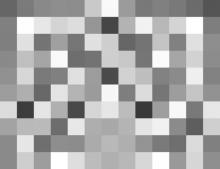 Tipperary: A Novel of Ireland
Tipperary: A Novel of Ireland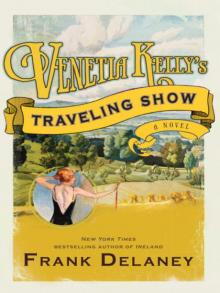 Venetia Kelly's Traveling Show: A Novel of Ireland
Venetia Kelly's Traveling Show: A Novel of Ireland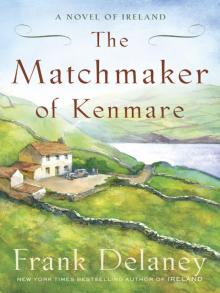 The Matchmaker of Kenmare
The Matchmaker of Kenmare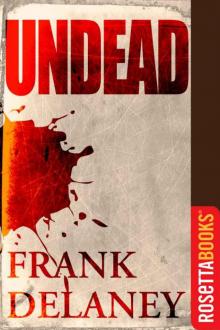 Undead (Kindle Single)
Undead (Kindle Single)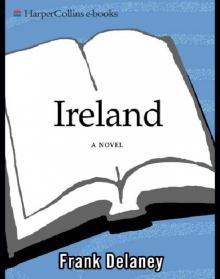 Ireland
Ireland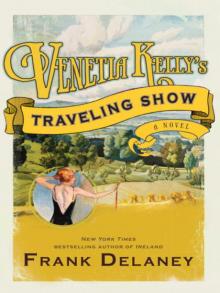 Venetia Kelly's Traveling Show
Venetia Kelly's Traveling Show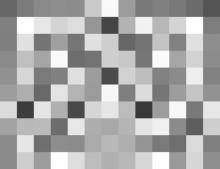 Tipperary
Tipperary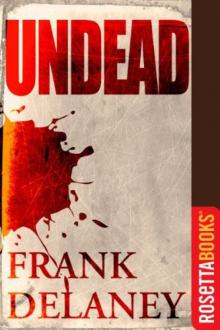 Undead
Undead